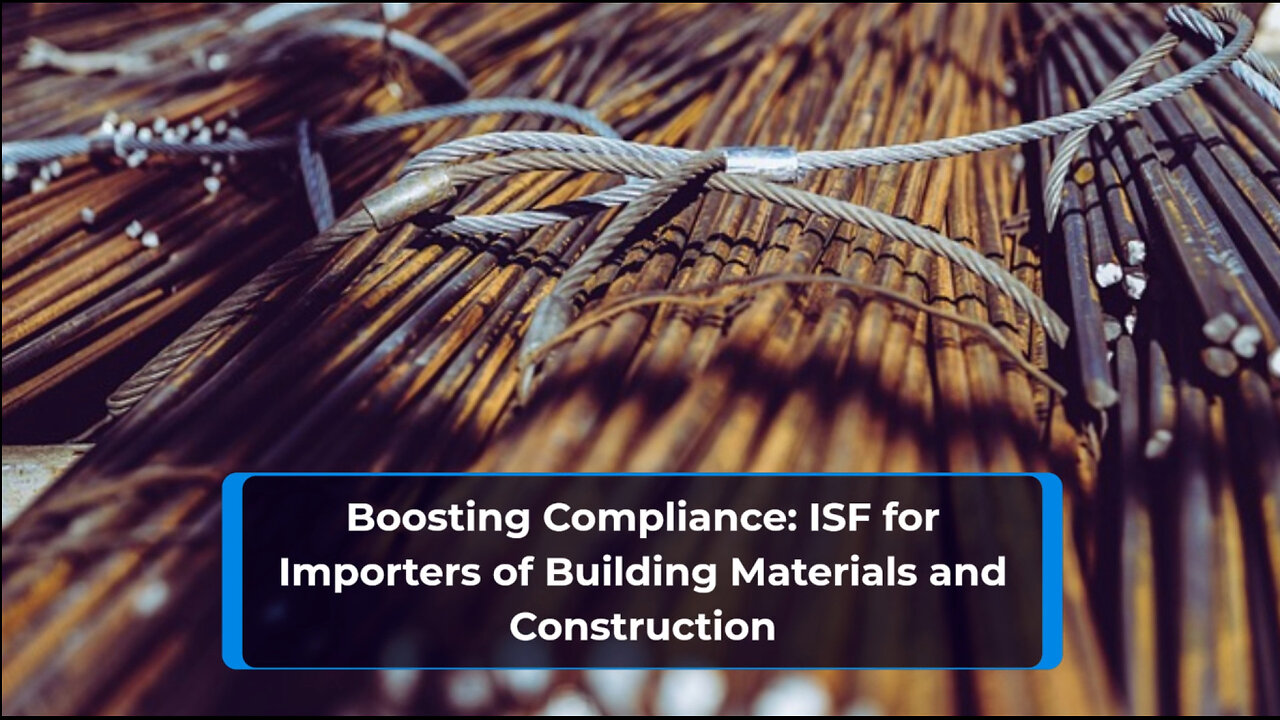Premium Only Content

Mastering ISF Compliance for Importers of Building Materials
ISF Solution | (832-904-9333)
clearance@isfsolution.com | www.isfsolution.com
The Importer Security Filing (ISF) is a critical requirement for companies involved in the importation of building materials and construction products. ISF is mandated by the US Customs and Border Protection (CBP) and requires importers to provide information about their shipments before they arrive at US ports. This includes details such as the importer's and seller's contact information, container stuffing location, and a detailed description of the imported goods.
Compliance with ISF requirements offers several benefits for importers in this industry. Firstly, it helps to streamline the customs clearance process, reducing the risk of delays or penalties. By providing accurate and timely information, importers enable CBP to assess security risks associated with the shipments, leading to enhanced supply chain security. Additionally, compliance with ISF requirements promotes transparency and visibility, allowing importers to have better control over their import processes.
To ensure successful ISF compliance, importers should follow some best practices. It is crucial to maintain accurate and up-to-date product information, including HS codes and descriptions. Regularly reviewing and updating this information will help optimize supply chain operations. Establishing strong communication channels with suppliers and others involved in the import process can also ensure timely and accurate submission of ISF.
Partnering with a professional customs brokerage firm can significantly simplify the ISF compliance process. Customs brokers have the expertise to navigate customs regulations and ensure accurate and timely filing of ISF. They can assist importers by reviewing product information, preparing and submitting the ISF on their behalf, and handling any potential customs issues or inquiries. Collaborating with a customs brokerage firm allows importers to focus on their core business while ensuring compliance with ISF requirements.
In conclusion, compliance with ISF requirements is crucial for importers in the building materials and construction industry. It helps streamline customs clearance, enhances supply chain security, and provides better control over import operations. Following best practices and partnering with a customs brokerage firm can further facilitate ISF compliance and help importers navigate the complexities of importing building materials and construction products.
#usimportbond #isfcustomsbroker #uscustomsclearing #isfentry
Video Disclaimer Here: For educational purposes - No affiliation with US government sectors.
-
 LIVE
LIVE
Josh Pate's College Football Show
1 hour agoCFB’s Top 12 Programs | TV Executives & Our Sport | USC Changes Coming | Early Championship Picks
202 watching -
 LIVE
LIVE
Vigilant News Network
5 hours agoUK Government BUSTED in Secret Plot to Extract Your Data | Media Blackout
1,451 watching -
 1:03:32
1:03:32
Winston Marshall
3 days ago"War On Children!" The DEMISE Of The West Starts With Schools - Katharine Birbalsingh
62K58 -
 48:02
48:02
Survive History
8 hours agoCould You Survive as a Sharpshooter in the Napoleonic Wars?
8.79K1 -
 12:03
12:03
Space Ice
9 hours agoSteven Seagal's China Salesman - Mike Tyson Knocks Him Out - Worst Movie Ever
5.68K13 -
 11:37
11:37
Degenerate Jay
8 hours agoJames Bond Needs Quality Over Quantity From Amazon
4.04K2 -
 15:23
15:23
Misha Petrov
9 hours agoTrad Wives & Girl Bosses Go to WAR!
6.59K31 -
 2:03:11
2:03:11
TheDozenPodcast
7 hours agoFootball villain fighting the state: Joey Barton
3.29K -
 LIVE
LIVE
Scottish Viking Gaming
10 hours ago💚Rumble :|: Sunday Funday :|: Smash the Blerps and Vape the Terpes
732 watching -
 1:45:00
1:45:00
RG_GerkClan
11 hours ago🔴LIVE Sunday Special - It's Time for World Domination - Civilization VII - Gerk Clan
58.5K27